Hanoi – Less than 10% of people with colorectal cancer are diagnosed early; the majority seek medical attention at a late stage, making treatment difficult, according to Hospital 108.
This information was provided by Associate Professor Trieu Trieu Duong, Director of the Institute of Digestive Surgery, Military Hospital 108, at the scientific conference celebrating the establishment of the Vietnam Pelvic Floor Society on May 13th. The conference was attended by hundreds of experts and doctors from various hospitals, aiming to create a specialized network focusing on diseases related to the pelvic floor, anus, and rectum.
Colorectal cancer is the most common type of gastrointestinal cancer. It is closely linked to diet and lifestyle. According to GLOBOCAN 2020, this type of cancer ranks fourth in terms of new cases and fifth in terms of cancer-related deaths. Each year, Vietnam records approximately 16,000 new cases and about 8,000 deaths.
According to Associate Professor Duong, the detection rate of the disease in the first stage is still very rare, less than 10%. The reason is that early-stage colorectal cancer has very subtle symptoms, such as dull abdominal pain, bloating, diarrhea, constipation, or alternating diarrhea and constipation, and bloody stools. Patients often experience fatigue, weight loss, and unexplained anemia. By the time they feel a lump in their abdomen and seek medical attention, the disease is already in a late stage.
"For any disease, especially cancer, early detection is crucial for treatment," Mr. Duong said, advising people to get screened early to avoid the disease reaching a late stage, which makes treatment more difficult and shortens the lifespan and quality of life.
However, at Military Hospital 108, the percentage of patients diagnosed with the disease in stages 2-3 has increased to 60-65%, compared to 70-80% in the late stages previously. "When the disease is detected in the early stages, treatment is very feasible; with just chemotherapy, radiation therapy, or simple surgery, patients can live well," said Dr. Duong, adding that the increase in early detection is due to people's growing awareness of disease screening.
Thanks to early detection and effective treatment, patients with colon cancer have a higher survival rate. Specifically, a study at the 108 Military Hospital showed that 73% of patients survived for more than 5 years, compared to 45% previously. Besides early screening, surgical techniques, thorough lymph node dissection, and the effects of chemotherapy and radiotherapy also contribute to extending the lifespan of patients.
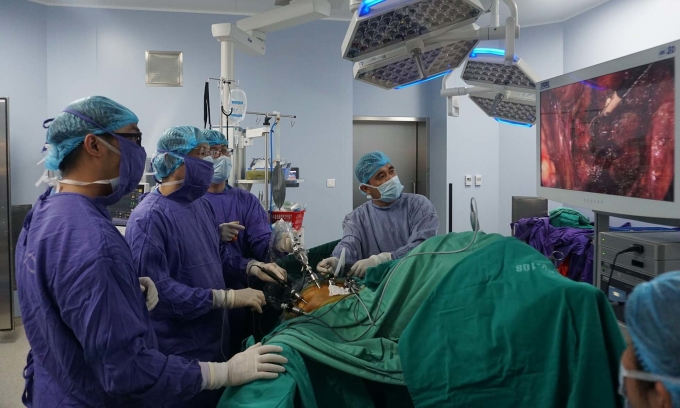
A rectal cancer surgery at Hospital 108. Photo: Provided by the hospital.
Associate Professor Duong stated that colorectal cancer is currently showing signs of affecting younger people, due to lifestyle factors in addition to genetics. Dr. Subhankar Chakraborty, a gastroenterologist at the Comprehensive Cancer Center, Ohio State University, USA, also noted that diet and lifestyle are contributing factors. This is one of the reasons for the increase in colon cancer cases.
"Smoking, lack of physical activity, alcohol consumption, being overweight or obese, and increased consumption of red meat can all lead to cancer," Dr. Chakraborty told CNN.
To prevent the disease, doctors recommend early detection of colon cancer for people over 50 or with risk factors, through fecal occult blood tests and colonoscopy. Depending on the lesions detected, doctors may schedule colonoscopies every 3-5 years.
Le Nga
Source link



![[Photo] Prime Minister Pham Minh Chinh holds a phone call with the CEO of Russia's Rosatom Corporation.](/_next/image?url=https%3A%2F%2Fvphoto.vietnam.vn%2Fthumb%2F1200x675%2Fvietnam%2Fresource%2FIMAGE%2F2025%2F12%2F11%2F1765464552365_dsc-5295-jpg.webp&w=3840&q=75)



![[Photo] Closing Ceremony of the 10th Session of the 15th National Assembly](/_next/image?url=https%3A%2F%2Fvphoto.vietnam.vn%2Fthumb%2F1200x675%2Fvietnam%2Fresource%2FIMAGE%2F2025%2F12%2F11%2F1765448959967_image-1437-jpg.webp&w=3840&q=75)






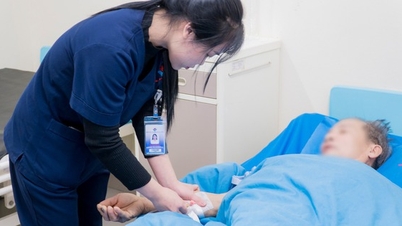





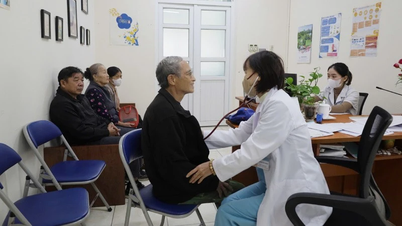





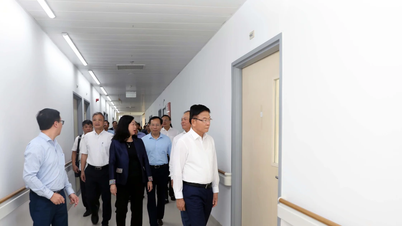































![[OFFICIAL] MISA GROUP ANNOUNCES ITS PIONEERING BRAND POSITIONING IN BUILDING AGENTIC AI FOR BUSINESSES, HOUSEHOLDS, AND THE GOVERNMENT](https://vphoto.vietnam.vn/thumb/402x226/vietnam/resource/IMAGE/2025/12/11/1765444754256_agentic-ai_postfb-scaled.png)




































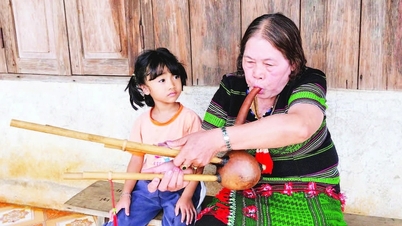















Comment (0)